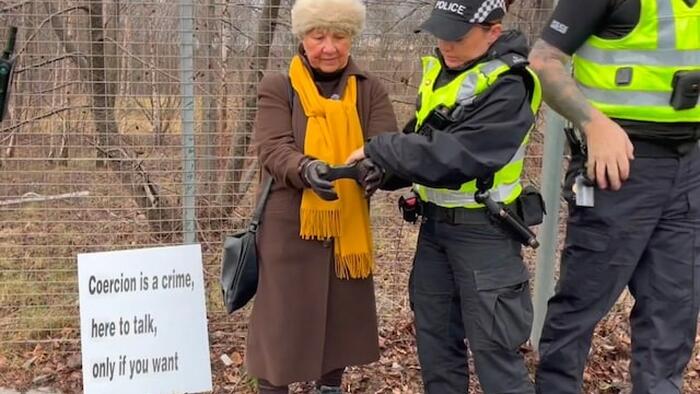


Rose Docherty is what they call a criminal recidivist in the United Kingdom. The 75-year-old woman has been arrested for a second time for the same fiendish act: offering to speak to women considering an abortion. She was arrested outside the Queen Elizabeth University Hospital in Glasgow for carrying a placard which stated “Coercion is a crime, here to talk, only if you want.” Fortunately, she and her sign were quickly seized by the local police to protect the public.
Free speech literally does not have a prayer in the United Kingdom. We previously discussed the case of Isabel Vaughan-Spruce, who was arrested for standing near an abortion clinic while silently praying. Police asked what she was doing standing at the location and when she said that she was praying in her head, they arrested her.
How Docherty ended up in the hoosegow in Glasgow is a chilling tale of how censorship can consume a nation.
The Abortion Services (Safe Access Zones) Act came into force last September. The architect of the law, Scottish Green MSP Gillian Mackay, denounced protests of abortions as “totally unacceptable abuse and obstruction” outside hospitals. So it is now a crime to behave in ways that could influence the decisions of women and staff to access services within the buffer zones.
In other words, it is a crime to exercise free speech. In this case, the “unacceptable abuse” was offering to speak with other women about abortion.
The United Kingdom shows how limiting speech can create an insatiable appetite for greater and greater speech controls. I discuss the UK as a cautionary tale for the United States in my book, The Indispensable Right.
A man was convicted for sending a tweet while drunk referring to dead soldiers. Another was arrested for an anti-police t-shirt. Another was arrested for calling the Irish boyfriend of his ex-girlfriend a “leprechaun.” Yet another was arrested for singing “Kung Fu Fighting.” A teenager was arrested for protesting outside of a Scientology center with a sign calling the religion a “cult.”
British censorship now extends to not just silent prayers but toxic thoughts.
Last year, Nicholas Brock, 52, was convicted of a thought crime in Maidenhead, Berkshire. The neo-Nazi was given a four-year sentence for what the court called his “toxic ideology” based on the contents of the home he shared with his mother in Maidenhead, Berkshire.
While most of us find Brock’s views repellent and hateful, they were confined to his head and his room. Yet, Judge Peter Lodder QC dismissed free speech or free thought concerns with a truly Orwellian statement: “I do not sentence you for your political views, but the extremity of those views informs the assessment of dangerousness.”
Lodder lambasted Brock for holding Nazi and other hateful values:
“[i]t is clear that you are a right-wing extremist, your enthusiasm for this repulsive and toxic ideology is demonstrated by the graphic and racist iconography which you have studied and appeared to share with others…”
Even though Lodder agreed that the defendant was older, had limited mobility, and “there was no evidence of disseminating to others,” he still sent him to prison for holding extremist views.
After the sentencing Detective Chief Superintendent Kath Barnes, Head of Counter Terrorism Policing South East (CTPSE), warned others that he was going to prison because he “showed a clear right-wing ideology with the evidence seized from his possessions during the investigation….We are committed to tackling all forms of toxic ideology which has the potential to threaten public safety and security.”
The idea of cracking down on “toxic ideologies” is of course nothing new in countries like China and Iran. However, the anti-free speech movement in Europe has succeeded in destroying the foundations for free speech in the West. the European Union is now one of the most hostile, anti-free speech organizations in the world.
As the anti-free speech movement grows in this country, citizens need to look at Europe for where this path would take us. Americans are appearing before the EU and speaking at European conferences in support of such measures. Anti-free speech views and books are all the rage in academia. It is a dangerous conceit to believe that what has occurred in Europe cannot occur here.
Just ask Rose Docherty.
